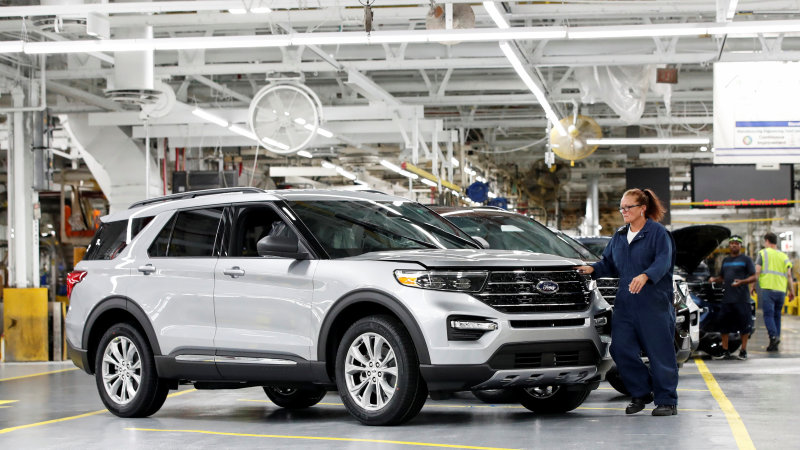Automakers around the world are closing assembly lines due to a global shortage of semiconductors that has been exacerbated in some cases by the Trump administration’s actions against major Chinese chip factories, officials said.
The shortage, which overwhelmed much of the industry and could last for many months, is now causing Ford, Subaru and Toyota to limit production in the United States.
Automakers in other markets include Volkswagen, Nissan and Fiat Chrysler Automobiles.
The problems stem from a confluence of factors as car makers compete with the sprawling consumer electronics industry for chip supplies. Consumers stocked up on laptops, game consoles and other electronic products during the pandemic, leaving a tight chip supply in 2020.
They also bought more cars than industry officials expected last spring, further straining stocks.
In at least one case, the deficit can be traced back to President Donald Trump’s policy of restricting technology transfers to China.
An automaker moved chip production from China’s Semiconductor Manufacturing International, or SMIC, which was hit by U.S. government restrictions in December, to Taiwan Semiconductor Manufacturing Co in Taiwan, which was in turn overbooked, a person familiar with the matter told Reuters .
An automotive supplier confirmed that TSMC could not keep up with demand.
“The systemic aspect of the crisis is giving us headaches,” said a supplier executive, who asked not to be identified. “In some cases we find replacement parts that could make us independent from TSMC, but then we discover that the alternative wafer manufacturer has no available capacity.”
TSMC and SMIC did not immediately respond to requests for comment.
During a profit call with investors on Thursday, TSMC CEO CC Wei said there was a shortage of auto chips made with “mature technology” and that it is working with customers “to mitigate the impact of the shortage.”
It only takes the smallest chips to drop production: a Ford factory in Kentucky that is idling the Escape SUV due to a shortage of a chip in the vehicle’s braking system, a union official at the factory said.
Ford will also shut down its Focus plant in Saarlouis, Germany, for a month from next week due to chip shortages.
The situation is unlikely to improve anytime soon, as all chips, whether they are for a laptop or a Lexus, begin life as a silicon wafer that takes about 90 days to be processed into a chip.
The chip manufacturing industry has always struggled to keep up with the sudden spikes in demand. The factories that produce wafers cost tens of billions of dollars to build, and can take up to a year to test and qualify their capacity for complex tools.
“In short, demand is up about 50%. And there’s no asset-intensive industry like ours with 50% capacity,” said Mike Hogan, senior vice president at chip maker GlobalFoundries and head of the automotive industry. unit.
HUAWEI EFFECT
Limited capacity and rising demand have made it difficult for chip makers to absorb two shocks from the Trump administration.
First, in September, the White House banned Huawei Technologies Co Ltd, the Chinese telecommunications giant and a major smartphone manufacturer, from purchasing chips made with US technology. Huawei banned chips from continuing to build what products it could after it went into effect. And Huawei’s rivals, who saw an opportunity to take market share, started buying chips, analysts said.
Second, the U.S. government has enacted rules that prohibit SMIC from using certain U.S. tools to make chips, a move that at least prompted some SMIC customers to look for a different chip factory over concerns that production could be disturbed.
“There is a fear of using a Chinese chip factory if the United States places them on an entity list,” said Daniel Goehl, UltraSense Systems chief business officer, referring to possible further restrictions.
A trade department spokesperson declined to comment on the implications of the SMIC and Huawei blacklists for the auto industry, but said the top priority was “to ensure that the Export Administration Regulation safeguards national security, economic security and interests. of foreign policy “.
Analysts said the auto chip shortage will likely persist for as long as six months. A report from AutoForecast Solutions estimated that the global auto industry had already seen a lost volume of 202,000 vehicles by January 13.
Executives at auto manufacturers and suppliers said they are adjusting production schedules to protect chips used in higher-profit vehicles. And companies are weighing chips from more suppliers and increasing inventory levels in the future.
“It’s fourth dimensional chess all day long,” said an auto official, who asked not to be identified.
